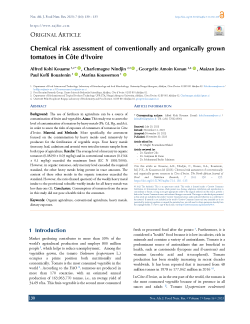Chemical risk assessment of conventionally and organically grown tomatoes in Côte d'Ivoire
Abstract
Background: The use of fertilizers in agriculture can be a source of contamination of fruits and vegetables. Aims: This study was to assess the level of contamination of tomatoes by heavy metals (Pb, Cd, Hg, and As), in order to assess the risks of exposure of consumers of tomatoes in Côte d'Ivoire. Material and Methods: More specifically, the assessment focused on the contamination by heavy metals used intensively by producers for the fertilization of vegetable crops. Four heavy metals (mercury, lead, cadmium and arsenic) were tested in tomato samples from both types of agriculture. Results: The average level of mercury in organic tomatoes (0.08290 ± 0.03 mg/kg) and in conventional tomatoes (0.1564 ± 0.1 mg/kg) exceeded the maximum limit (EC N 1881/2006). However, in organic tomatoes, only mercury level exceeded the required standard, the other heavy metals being present in trace amounts. The content of these other metals in the organic tomatoes exceeded the standard. However, the ratio (hazard quotient) of the weekly heavy metal intake to the provisional tolerable weekly intake for all heavy metals was less than one (1). Conclusion: Consumption of tomatoes from the areas in this study did not pose a health risk to the consumer.
Keywords: Organic agriculture, conventional agriculture, heavy metals, dietary exposure.
Full text article
Authors
Copyright (c) 2023 Alfred Kohi Kouame, Charlemagne Nindjin, Georgette Amoin Konan, Maizan Jean-Paul Koffi Bouatenin, Marina Koussemon

This work is licensed under a Creative Commons Attribution 4.0 International License.
-
Attribution — You must give appropriate credit, provide a link to the license, and indicate if changes were made. You may do so in any reasonable manner, but not in any way that suggests the licensor endorses you or your use.
-
No additional restrictions — You may not apply legal terms or technological measures that legally restrict others from doing anything the license permits.





